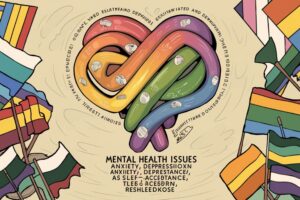How to Promote Mental Health in LGBTQIA+ Communities?
Promoting mental health within LGBTQIA+ communities is an essential endeavor that requires a deep understanding of the unique challenges faced by individuals within this diverse group.
The intersectionality of gender identity, sexual orientation, and societal norms can significantly impact mental well-being. Discrimination, stigma, and lack of access to affirming mental health services further compound these challenges.
In this article, we delve into strategies to promote mental health in LGBTQIA+ communities, focusing on fostering acceptance, ensuring access to inclusive care, empowering individuals through supportive networks, advocating for policy changes, and promoting self-care and resilience.
This article explores various strategies and resources aimed at promoting mental health and fostering a supportive environment for LGBTQIA+ individuals to thrive.

Table of Contents
ToggleImportance of Mental Health in LGBTQIA+ Communities
Mental health is a critical component of overall well-being for individuals within LGBTQIA+ communities. Members of these communities often face unique challenges and stressors related to discrimination, stigma, and societal expectations regarding gender and sexuality.
As a result, rates of mental health disorders such as depression, anxiety, and substance abuse are disproportionately higher among LGBTQIA+ individuals compared to the general population.
Furthermore, many individuals within these communities may also struggle with issues such as internalized homophobia or transphobia, making it even more crucial for them to prioritize their mental health.
Ensuring adequate mental health support and resources for LGBTQIA+ individuals is essential in promoting their overall health and well-being. Providing affirming and culturally competent mental health services can help individuals feel supported and understood, reducing feelings of isolation and despair.
Additionally, addressing mental health within LGBTQIA+ communities can help combat the social stigma and discrimination that contribute to mental health disparities.
By advocating for greater awareness and acceptance of diverse gender and sexual identities, and by promoting self-care and self-compassion within these communities, we can strive to create a more inclusive and supportive environment where everyone can succeed.
Read more about “The Impact of Myeloid Leukemia on Patients and Families!”
Understanding Unique Challenges Faced by LGBTQIA+ Individuals
The LGBTQIA+ community faces unique challenges that are often not widely understood or acknowledged. One of the key challenges that individuals in this community often face is discrimination and stigma.
Many LGBTQIA+ individuals experience prejudice and discrimination in various aspects of their lives, including employment, housing, healthcare, and education. This can have a significant impact on their mental health and well-being, as they may feel marginalized and excluded from society.
Another challenge faced by LGBTQIA+ individuals is the lack of acceptance and support from their families and communities. Coming out as LGBTQIA+ can be a difficult and sometimes traumatic experience for many individuals, as they may face rejection and disapproval from those closest to them.

This lack of acceptance and support can lead to feelings of isolation and loneliness, as well as a sense of shame and self-doubt. It is important for society to create spaces that are inclusive and welcoming for all individuals, regardless of their sexual orientation or gender identity.
Overall, it is crucial for individuals to educate themselves about the unique challenges faced by the LGBTQIA+ community and to work towards creating a more inclusive and accepting society.
By listening to the voices of LGBTQIA+ individuals and supporting their rights and well-being, we can help to create a world where everyone feels safe, respected, and valued for who they are.
It is important for society to work towards understanding and addressing the systemic barriers and prejudices that impact the lives of LGBTQIA+ individuals, and to advocate for change and equality for all.
Read more about “Understanding the Genetic Factors of Myeloid Leukemia and the Emerging Treatments”
Impact of Minority Stress and Discrimination in LGBTQIA+ Communities
The impact of minority stress and discrimination in LGBTQIA+ communities are profound and far-reaching. Minorities within the community face constant exposure to stigma, prejudice, and systemic discrimination on a daily basis.
This chronic stress can lead to serious mental health issues such as depression, anxiety disorders, substance abuse, and even suicide. Studies have shown that LGBTQIA+ individuals are at a higher risk for experiencing physical and mental health disparities due to this ongoing stress.

The need for increased support systems, advocacy efforts, and inclusive policies within both the healthcare system and society at large is crucial in addressing the negative effects of minority stress and discrimination on LGBTQIA+ individuals.
By creating safe spaces, promoting acceptance, and advocating for equal rights, we can help mitigate the damaging impacts of societal oppression on these marginalized communities.
Read more about “What are the Causes and Symptoms of Coronary Artery Disease and How to Treat?”
Creating Safe Spaces for LGBTQIA+ Individuals to Seek Support
Creating a safe space for LGBTQIA+ individuals to seek support is crucial in fostering a sense of community and understanding for this often-marginalized group.
In order to provide a supportive environment, it is imperative to establish a zero-tolerance policy for discrimination or judgment based on sexual orientation or gender identity. This can be achieved by implementing inclusive language and guidelines that promote respect and acceptance for all individuals, regardless of their LGBTQIA+ status.
Furthermore, offering resources and services specifically tailored to the needs of LGBTQIA+ individuals, such as counseling services or support groups, can help create a safe and affirming space for those seeking guidance and assistance.
Additionally, it is essential to educate staff and volunteers on LGBTQIA+ issues and provide training on how to appropriately support and interact with individuals from this community.
By raising awareness and promoting understanding, organizations can help create a more inclusive and supportive atmosphere for LGBTQIA+ individuals to feel comfortable seeking help and support. It is important to prioritize confidentiality and privacy in all interactions with LGBTQIA+ individuals, as many may fear discrimination or backlash from disclosing their true identities.
By actively working to create a safe space for LGBTQIA+ individuals to seek support, organizations can play a critical role in promoting equality and acceptance for all members of the community.
Read more about “The Slow Progression of Atherosclerosis: Recognizing the Warning Signs”
Educating Healthcare Providers on LGBTQIA+ Cultural Competency
In order to provide high-quality and inclusive healthcare to LGBTQIA+ individuals, it is essential for healthcare providers to undergo training in cultural competency.
This education should encompass a comprehensive understanding of the unique needs and challenges faced by LGBTQIA+ patients, including but not limited to disparities in access to care, discrimination experienced in healthcare settings, and specific health risks associated with sexual orientation and gender identity.
Providers must learn how to create an affirming and supportive environment for all patients regardless of their sexual orientation or gender identity, as well as familiarize themselves with relevant terminology and best practices for addressing these populations’ health concerns.
By promoting inclusivity through ongoing education and training on LGBTQIA+ cultural competency, healthcare providers can ensure that all individuals receive respectful and effective care that meets their unique needs.
Promoting Acceptance and Celebrating Diversity within LGBTQIA+ Communities
Promoting acceptance and celebrating diversity within LGBTQIA+ communities is essential for fostering inclusivity and understanding among individuals of different sexual orientations, gender identities, and expressions.
By creating a safe and welcoming environment for all members of the community, we can encourage mutual respect, support, and empowerment. Professional organizations can play a crucial role in promoting acceptance by implementing anti-discrimination policies, providing training on cultural competency, and offering resources for individuals to learn about LGBTQIA+ issues.
Celebrating diversity within these communities allows for the recognition and appreciation of the unique experiences and identities that contribute to the vibrancy and richness of our society.
Through education, advocacy, and visibility efforts, we can work towards creating a more inclusive society where everyone is celebrated for who they are.
Promoting Self-Care and Coping Strategies within the LGBTQIA+ Communities
Promoting self-care and coping strategies within the LGBTQIA+ communities is crucial to addressing the unique challenges faced by individuals within this diverse population. Members of the LGBTQIA+ community often experience high levels of discrimination, stigma, and social exclusion, which can have negative impacts on their mental health and well-being.
As a professional working with this community, it is important to provide resources and support that foster self-compassion, resilience, and empowerment.
This may include promoting mindfulness practices, encouraging healthy lifestyle behaviors, offering access to affirming therapy services, creating safe spaces for peer support, and advocating for policies that protect LGBTQIA+ rights.
By working collaboratively with community members and organizations, professionals can help promote self-care strategies that enhance overall quality of life and promote positive mental health outcomes within the LGBTQIA+ communities.
Advocating for Policy Changes to Support LGBTQIA+ Mental Health
Advocating for policy changes to support LGBTQIA+ mental health is crucial in creating an inclusive and supportive environment for individuals within this community. Research consistently shows that LGBTQIA+ individuals experience disproportionately higher rates of mental health issues such as depression, anxiety, and suicide compared to their heterosexual counterparts.
To address these disparities, policies need to be put in place that prioritize the unique needs of LGBTQIA+ individuals and provide comprehensive mental health services tailored to their specific experiences.
This may include increasing funding for LGBTQ-affirming mental health programs, training healthcare providers on cultural competency when working with LGBTQIA+ clients and implementing anti-discrimination laws to protect individuals from discriminatory practices based on their sexual orientation or gender identity.
By advocating for these policy changes, we can work towards creating a more inclusive and affirming society where all individuals have access to the mental health resources they need to thrive.
Addressing Stigma and Discrimination within the LGBTQIA+ Communities
Addressing stigma and discrimination within the LGBTQIA+ communities is a crucial aspect of ensuring the well-being and safety of individuals across all gender and sexual identities. As professionals, it is important to acknowledge that stigma and discrimination are pervasive issues that can have detrimental effects on mental health, self-esteem, and overall quality of life for LGBTQIA+ individuals.
In order to combat these harmful attitudes and behaviors, professionals must prioritize education, advocacy, and creating safe spaces for those who may be facing discrimination.
This can involve providing culturally competent care, promoting inclusivity in policies and practices, and actively challenging discriminatory language or actions within professional settings.
By taking proactive steps to address stigma and discrimination within LGBTQIA+ communities, professionals can create a more supportive environment where all individuals are respected and able to thrive.
Empowering LGBTQIA+ Individuals to Prioritize Their Mental Well-Being
In order to empower LGBTQIA+ individuals to prioritize their mental well-being, it is crucial for mental health professionals and service providers to create safe and inclusive spaces for people to freely explore their identities and experiences without worrying about being judged or discriminated against.
This can be achieved through culturally competent care that takes into account the unique challenges faced by LGBTQIA+ individuals, such as stigma, discrimination, and internalized homophobia or transphobia. It is essential to provide education and resources tailored to the specific needs of this community, including access to affirming therapy, support groups, and other mental health services.

By promoting self-acceptance, resilience, and self-care practices within the LGBTQIA+ community, we can empower individuals to advocate for their own well-being and foster a sense of belonging and connection with others.
Ultimately, prioritizing mental health within this population not only improves individual well-being but also contributes to a more equitable and inclusive society as a whole.
Removing Barriers to Accessing Mental Health Care in the LGBTQIA+ Communities
In order to effectively remove barriers to accessing mental health care in LGBTQIA+ communities, it is crucial for mental health professionals to undergo specialized training focused on understanding the unique needs and challenges faced by individuals within this population.
This training should include education on the impact of societal stigma, discrimination, and prejudice on mental health outcomes, as well as strategies for creating a safe and affirming therapeutic environment.
Additionally, mental health providers must actively work to address their own biases and assumptions in order to provide culturally competent care that respects and validates the diverse identities and experiences of LGBTQIA+ individuals.
Providing accessible and affordable services through outreach programs, community partnerships, and telehealth options can also help ensure that marginalized individuals have equitable access to necessary mental health support.
By prioritizing inclusivity, empathy, and advocacy in their practice, mental health professionals can play a critical role in reducing disparities in care for LGBTQIA+ communities.
Conclusion:
In conclusion, by actively working towards understanding and addressing the unique mental health needs of LGBTQIA+ communities, we can create a more inclusive and supportive environment for all individuals. Through education, advocacy, and community empowerment, we can promote mental well-being, reduce stigma and ensure that everyone within the LGBTQIA+ spectrum has access to the necessary resources and support.
Together, we can continue to strive for a future where mental health care is affirming, accessible, and empowering for all members of the LGBTQIA+ community.
FREQUENTLY ASKED QUESTIONS
1. Why is it important to promote mental health in LGBTQIA+ communities specifically?
It is crucial to promote mental health within LGBTQIA+ communities due to the unique challenges and disparities faced by individuals who identify as lesbian, gay, bisexual, transgender, queer, intersex, or asexual. Research has consistently shown that LGBTQIA+ individuals experience higher rates of anxiety, depression, substance abuse, and suicide attempts compared to their heterosexual counterparts.
This can be attributed to various factors such as societal stigma and discrimination, internalized homophobia or transphobia, lack of acceptance from family and peers, and barriers to accessing affirming healthcare services.
By addressing mental health needs within LGBTQIA+ communities through education, support services, culturally competent therapy options and fostering a sense of belonging and acceptance can help reduce the negative impacts of these stressors. Ultimately promoting mental health in LGBTQIA+ communities is essential for supporting the well-being and overall quality of life for individuals within this diverse population.
2. How can individuals outside the LGBTQIA+ community support mental health initiatives within this group?
Individuals outside of the LGBTQIA+ community can support mental health initiatives within this group by becoming informed allies and advocates. This can include educating themselves on the unique challenges that LGBTQIA+ individuals face regarding mental health, such as higher rates of depression, anxiety, and suicide attempts due to discrimination and stigma.
Furthermore, allies can help create safe and inclusive spaces for LGBTQIA+ individuals by promoting acceptance and understanding in their personal and professional networks. Supporting LGBTQIA+-led mental health organizations through donations, volunteering, or spreading awareness about their services is also crucial in addressing the mental health needs of this marginalized population.
By actively working to reduce systemic barriers and promote emotional well-being for LGBTQIA+ individuals, allies can play a significant role in creating a more supportive and affirming society for all.
3.What are some common barriers that LGBTQIA+ individuals face when seeking mental health care?
LGBTQIA+ individuals often face numerous barriers when seeking mental health care, including discrimination from healthcare providers, lack of culturally competent services, and fear of being judged or misunderstood. Some practitioners may display heteronormative biases or lack understanding of gender identity and sexual orientation diversity, leading to inadequate or inappropriate care.
Additionally, LGBTQIA+ individuals may struggle to find providers who are knowledgeable about the unique challenges they face, such as coming out experiences, family rejection, and societal stigma. Furthermore, financial constraints and limited access to LGBTQ-friendly resources can further hinder their ability to receive proper treatment.
These barriers not only perpetuate disparities in mental health outcomes for LGBTQIA+ individuals but also contribute to a lack of trust in the healthcare system as a whole. Efforts must be taken to address these systemic issues and improve access to affirming and inclusive mental health care for this marginalized population.


